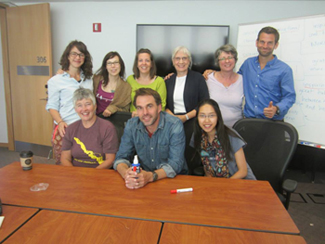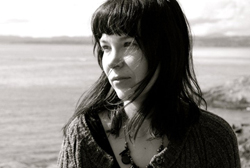The Object of our Care:
Susan Sanford Blades in Conversation
with Dora Dueck

Dora Dueck and Susan Sanford Blades at the Banff Centre with instructor Alexander MacLeod.
Following her Novella 2014 win with her story, "Mask," Dora Dueck was recently interviewed by former Malahat publicity manager (and fellow Banff Centre workshopper) Susan Sanford Blades.
Read the original announcement page highlighting Dora's contest win.
Dora, we spent a week this past September together at the Banff Centre in a 'Writing with Style' workshop with Alexander MacLeod, and I’m now so thrilled for you that an expanded version of the piece you brought to Banff, “Mask,” has won The Malahat Review’s Novella Prize! Congratulations!
Thanks, Susan. I have wonderful memories of that week as well as meeting you and reading your work. I’m delighted we’re connecting again through this interview.
Was this story informed at all by any of your personal experience (via family, etc.) with the war? How did you come to write about this topic?
My background is Mennonite, and Mennonites, traditionally, are conscientious objectors. Both my grandfathers, then citizens of Russia, did alternative service in the First World War, as medics—one in Austria and Germany, the other in the Caucasus region on trains carrying wounded soldiers from the front. I didn’t lose anyone to the war, but have often encountered the period in my reading and studies. I’ve sometimes been overwhelmed, although I’m not sure why, with sorrow and anger over that particular conflict. Its senselessness, the horrendous losses. Incidentally, this year marks 100 years since that War’s beginning, so it will be in the public eye again.
When did you start working on “Mask”? Take us through the story’s genesis.
About a year ago January, when I was open for a new idea (I’d used most of my others in a short fiction collection, and my current novel project was drafted), I happened to be reading Into the Silence: The Great War, Mallory, and the Conquest of Everest by Wade Davis. A small detail, about camps for men with facial wounds, stuck with me. I jotted a story idea involving such a veteran and his family in my journal. Once I’d given it space in my head, it began to develop and evolve.
I was also inspired—riveted, really—by how Emma Donaghue used historical incident in her short fiction collection, Astray, to explore themes that interested her. Stories set in other times and predicaments are appealing to write because of where one has to go, but the human complications one finds—in “Mask’s” case, the trauma of war and child-parent relationships—are universal, and contemporary.
I recall the heated debate we had in workshop in Banff as to the mother, Dolly’s redeemability. How do you see her? Is she protecting her husband from the world or protecting the world from her husband?
Destruction of the face is probably the hardest for individuals and the public to bear because of what the face represents. So yes, there’s a great deal of protecting—covering—going on here. In all directions. Jane protects herself and her mother from what she’s discovered about her father, and so on. And yet each longs for the others to know what they know, or some version of it at least.
As far as Dolly, the mother, is concerned, she’s the most invested in managing the circumstances. She has a strong personality and the reader may find her a strain at times, as does Jane. Certainly the story critiques her and the ways we conceal the realities of war. But redeemability? If by that you mean, can or will she change, the answer is, she didn’t, not really. I don’t think of Dolly in terms of redemption, though. She may be mistaken, and overbearing, and it may be a cover or it may be genuine, but the love and loyalty at the core of her is huge. She’s handling this the way she knows how. I’m sympathetic to, and fond of, all the characters in this triangle. I hope that comes through. If there’s a villain, it’s the war. Jane is looking back, tracing her path of yearning and separation, it’s a coming-of-age of sorts, but ultimately, she lets her mother be.
This story deals a lot with the notion of duty. Is this a common theme in your writing?
It’s a strong theme here because duty was a virtue of the period—duty to God and country, for those who served in the war, and for those at home. I’m not sure how much it appears in my other writing; readers will know best. Themes I’ve explored intentionally before include the immigrant experience, displacement, and secrets. And I’m endlessly interested in family relationships.
Can you tell us about how your writing life has unfolded? You have two novels published, the first in 1989, and a collection of short stories which came out in 2012. When did you begin to write in earnest and how did your writing evolve?
The short version is: it unfolded in fits and starts. During my years at home with our children and assisting behind the scenes in my husband’s business, I did some freelance editing and writing of articles and so on. Two years spent in Paraguay on a development project gave me a subject for my first novel. That turned out well enough, so I began another, which proceeded with many interruptions. I went back to university after the kids were launched, to do an MA in history. I love to research and study. I also worked five years as editor with a national church magazine. I don’t regret any of this, but I might have stopped trying to sew and do crafts sooner than I did and focus on words, which is where I belong! Currently I’m able to work quite steadily at my writing, and I’m glad for this.
What did you find to be the most beneficial aspect of having “Mask” workshopped at the Banff Centre (or of being there in general)?
I’d never attended a writing workshop like that and decided to treat myself. I applied to that session because of instructor Alexander MacLeod, whose work I admire. I came home rejuvenated, not on account of the technical bits we learned or reviewed as much as his insistence that what we were doing was important, that good stories matter. We didn’t talk about publishing or promotion or all those necessary but anxiety-producing things writers get bogged down with, but stayed with story—“the object,” as he put it, “of our care.” Writing is solitary and requires a lot of positive self-talk, which easily runs dry. That week was exactly what I needed. The mountain setting, the atmosphere of the Banff Centre (even if we got in trouble for eating the oil folks’ coffee snacks), the gorgeous weather, and new friends all worked their magic too. We were a fine, fun group, wouldn’t you agree?
As for my day under the microscope with “Mask,” I found the debate (to which I was allowed to listen, not speak) exhilarating, to be honest. It assured me that something vital was underway in the story, stimulated my thinking, and affirmed my desire to enlarge it.
We were a fine group, indeed. The Elite Eight, I believe, Alex called us. And I agree it was pretty great to hear feedback on how others’ read and perceived our work. Do you have any plans to attend other writing workshops or retreats?
No current plans.
What are you working on now and does it involve a home for “Mask”?
I’m close to finishing a novel about an archivist who confronts the life and mysterious death of her odd uncle. I’m incredibly pleased that “Mask” will appear in The Malahat Review, but haven’t thought much beyond that. I’m quite certain, however, that the story found its proper length and format and that I won’t expand it. And if it’s to land in a collection, I’ll have to get busy writing more stories!

Susan Sanford Blades
* * * * * * * *









